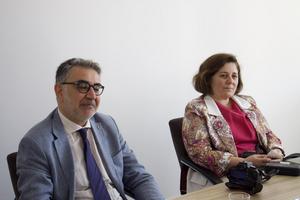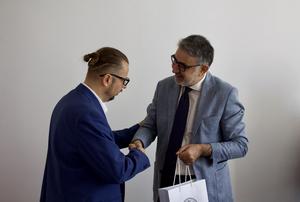In a significant gesture of academic diplomacy, Professor Onur Ender Aslan — widely regarded as the doyen of Turkish public administration education — and Professor Aslı Akay of the Ankara University of Social Sciences conducted a professional visit to the Faculty of Public Governance and International Studies at Ludovika – University of Public Service. The primary objective of the visit was to engage in a structured examination of the institutional architecture and operational dynamics of the Hungarian public administration system, with particular emphasis on the training of civil servants and the strategic orientation of human resource policies within the public sector.
Professors Aslan and Akay, both senior faculty members at the Faculty of Political Science in Ankara, bring decades of experience in public administration scholarship and institutional leadership. Professor Aslan previously served as Rector of the Turkish and Middle Eastern Public Administration Institute (TODAIE), while Professor Akay held the position of Deputy Director General at the same institution. Their recent collaborative research has extended to comparative administrative systems in Central and South Asia, including Uzbekistan, Mongolia, Iran, and Afghanistan, culminating in the publication of authoritative handbooks on the Turkish bureaucratic tradition and civil service regime.
The delegation was formally received by Dr. Péter Krisztián Zachar, Vice Dean for International Affairs, who provided a comprehensive overview of Ludovika’s public administration training model, including curricular design, institutional partnerships, and the integration of theoretical and practice-oriented components. The meeting facilitated a multi-departmental dialogue, with faculty members offering domain-specific insights into the Hungarian civil service framework. Dr. Csilla Paksi-Petró (Department of Human Resources) elaborated on employment typologies, performance evaluation mechanisms, and organizational development strategies. Dr. Márton Gellén (Department of Governance and Public Policy) addressed recruitment and promotion systems, contextualizing them within ministerial operations. Dr. József Sáfrán (Lőrincz Lajos Department of Administrative Law) provided a legal-structural analysis of civil service status, while Professor Erzsébet Nagyné Rózsa (Department of International Relations and Diplomacy) underscored the relevance of international benchmarking and intergovernmental cooperation.
The Turkish scholars expressed particular interest in the differentiated status categories within the Hungarian civil service, the methodologies underpinning career progression and performance appraisal, and the institutional design of continuing and postgraduate training programs. Their visit forms part of a broader research initiative, supported by diplomatic missions, aimed at producing a Turkish-language volume—edited by Professor Aslan—on the Hungarian public administration system, intended for an international readership.
Beyond its immediate academic value, the visit represents a strategic opportunity to enhance the visibility of Hungary’s administrative reforms and best practices within a comparative international framework. It also reinforces the role of Ludovika as a hub for transnational scholarly exchange in the field of public governance.
Text: International Division, FPGIS
Photos: András Szabó




